




By Willy Blackmore
mong the many, many provisions in the One Big Beautiful Bill Act that was signed into law on the Fourth of July are a host of environmental measures that continue the Trump administration’s work to undo any and all progress on climate change. “It is not an overstatement to say this is the most anti-environment bill in history,” Patrick Drupp, director of climate policy for the Sierra Club, said in a statement. As the Biden Administration was very focused on environmental and climate justice in particular, the new bill targets many of those
programs, too, and rescinds the Environmental Protection Agency’s Environmental and Climate Justice Program entirely.
Environmental activist Mustafa Ali put it plainly: “The bill greenlights pollution — literally. It weakens the Clean Air Act, disables the EPA’s ability to regulate toxic emissions,

“The all-too-short era of when the federal government made an effort to address climate justice, funneling billions of dollars into doing so, now seems even more squarely behind us.” Spencer Platt/Getty Images

By Stacy M. Brown
resident Donald Trump’s massive new spending measure, “One Big Beautiful Bill,” known by Democrats as the “One Big Ugly Bill,” is set to dismantle central pillars of the American social safety net and create the most expansive immigration enforcement system the country has ever seen.
By Jasmine McBride Associate Editor
ommunity leaders, health care workers, and civil rights attorneys gathered outside Hennepin County Medical Center (HCMC) on July 10 to demand a full, independent investigation into what they describe as a toxic workplace culture fueled by racial and gender discrimination, retaliation, and systemic inequity.
Led by civil rights attorney Sellano L. Simmons, the press conference highlighted first hand testimonies from current and former HCMC
employees, many of whom chose to remain anonymous due to fear of professional backlash. Simmons and fellow civil rights attorney Nekima Levy Armstrong called on the Hennepin County Board of Commissioners to initiate a third-party investigation free from the influence of HCMC leadership.
“We are hopeful that the Hennepin County Board will take accountability for what is happening and follow through on Attorney Simmons’ call,” said Levy Armstrong. “This is about people’s lives, careers and dignity.”
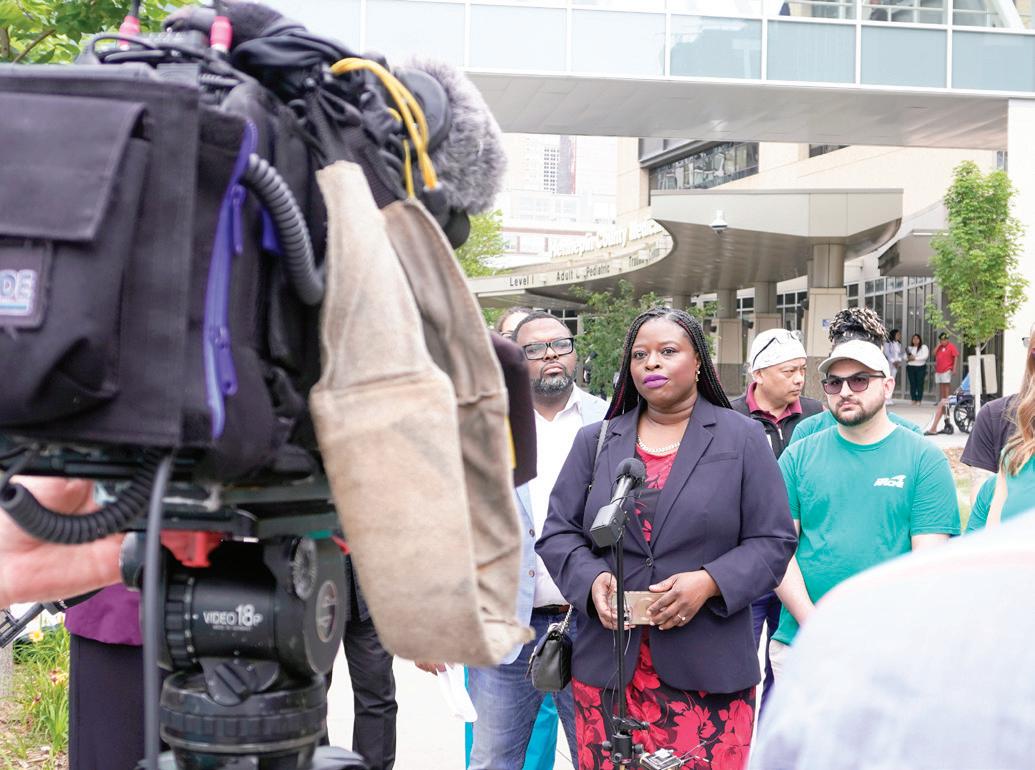
By Sheletta Brundidge Contributing Writer
oxes of dusty documents are now opening new windows into the history of the Civil Rights Movement.
“The Papers of Martin Luther King Jr.,” a 14-volume collection, offers a comprehensive look at Dr. King’s speeches, sermons, letters and writings, alongside insight into the many lesserknown figures who shaped the movement alongside him.
“Dr. King has become the focus of the history of the Civil Rights Movement, but so many regular people were involved,” said Meghan Weaver, research assistant at the Martin Luther King Jr. Research and Education Institute at Stanford University.
In 1985, Coretta Scott King, founder and president of The King Center, contacted Stan-
ford historian Dr. Clayborne Carson to edit and publish her late husband’s archives. The collection, initially stored in boxes in the basement of her home, is now being carefully published and studied. Seven volumes of the series have been released to date. The work highlights King’s enduring relevance beyond his most iconic moments.
“Dr. King is much more than his ‘I Have a Dream’ speech or the Selma to Montgomery march,” Weaver said.
“He was a big proponent of practicing nonviolence, especially in demonstrations, something that is applicable today. He also spoke of what he considered the triple evils: militarism, racism, and poverty. His writings are as relevant now as they were in the 1960s.” Weaver added that the papers reveal surprising details
about King’s relentless schedule and the collective nature of the movement. “One thing that strikes me is just how busy he was,” she said. “He would give a speech in Atlanta, fly to New York for a talk, then to Boston for another, and back to New York, all in one day, while still fitting in meetings.”
“Dr. King is much more than his ‘I Have a Dream’ speech or the Selma to Montgomery march.”
The collection also elevates figures like “Mother Pollard,” long known for the iconic line from the Montgomery Bus Boycott, “My feets is tired, but my soul is rested.” Her full
name, previously unknown, was likely Lou Pollard.
The legislation advances $1 trillion in cuts to Medicaid and the Affordable Care Act over the next decade, threatening health coverage for millions of low-income Americans. However, among the least discussed aspects of the measure, it effectively turns America into a police state.
Former director speaks out
While he was not at the press conference on July 10, among those who came forward is Farji Shaheer, a former 23-year employee who says he experienced years of discrimination while working at HCMC. Shaheer served as the director of the hospital’s Next Step program, the state’s first hospital-based violence intervention initiative, created to support survivors of gun violence and their families.
Shaheer described a pattern of retaliation that began after he started advocating for equitable treatment of patients and highlighting systemic failures. “A majority of the individuals who were African American, Native, or people of color were treated unfairly, especially in psychiatric care,” he said. “They were
The bill devotes more than $150 billion to expand the detention, surveillance, and deportation operations of Immigration and Customs
■ See POLICE on page 5
often medicated and admitted against their will because of miscommunication between staff and patients.”
In 2018, Shaheer said, the homicide rate in Minneapolis dropped to 28, in part due to the success of his program. But as the program gained visibility, internal tensions rose. He alleges that a colleague used his program’s funding to launch the hospital’s internal diversity, equity and inclusion efforts, while simultaneously pushing him out.
“Every time I spoke out against injustice, I was met with retaliation instead of support,” said Shaheer. He says he was demoted from program director to senior violence intervention specialist based on what he called “false narratives and fabricated claims.”
her left foot, caused by an old injury, she walked to work
represent the many community members whose sacrifices are often

Pollard was born in 1876 to formerly enslaved parents. She later moved to Montgomery, Ala., during the 1930s, where she met Dr. King during the bus boycott. Though struggling with gangrene in
“Her physical body was in rough shape,” Weaver said, “but her soul was at peace with what she was contributing to the movement.” Pollard and others like her
Sheletta Brundidge is
chil
dren’s author, an Emmy Award winning comedian, and a local activist. She is also a contributing writer for the Minnesota Spokesman-Recorder. For more information, visit www.shelettamakesmelaugh.com.
By Vickie Evans-Nash
Black-owned grocery stores have historically faced steep challenges in Minnesota, but Pastor Carl Johnson is changing the narrative. In 2019, his passion for food and community led him to open Storehouse Grocer & Coffee, making him the only Black grocer on St. Paul’s East Side.
A transplant from the East Coast, Johnson modeled his store more like a bodega than a typical Midwest supermarket. At just 2,200 square feet, a space often associated with corner stores, Storehouse Grocer & Coffee supports frequent, budget-friendly shopping trips rather than large, monthly hauls.
Located at 781 7th St. E., the store is accessible via bus line and offers far more than the usual convenience store fare. In addition to staples like fruits, vegetables and pasta, the store carries culturally diverse items such as fufu, sesame oil, Korean barbecue sauce, and chickpeas. While currently open Tuesday through Saturday, Johnson said they plan to expand hours to stay open until 9 p.m.
He considers himself a food justice activist. “People can’t live free unless they have good food,” Johnson said.
“If you’re eating bad food every day, you’re going to
feel depressed. You’re going to have some mental health issues. You’re going to feel inadequate.”
Johnson’s understanding of the connection between food and well-being began at home.
Raised in an intergenerational household, he credits his mother with cultivating his love of food. She frequently introduced her children to different cuisines, both through her cooking and by taking them to restaurants with her friends.
“When we were growing up, that was good food,” Johnson said. “We didn’t eat hamburgers and hot dogs.” Instead, he recalled dishes like salmon patties and crawfish étouffée, prepared for special occasions.
“Not everyone sees what the food industry can be for their lives.”
Later, while attending Bible college, Johnson met a chef who introduced him to nine different ways to prepare potatoes, sparking his frustration with bland institutional meals.
“Sometimes kids get food at school, and it’s just bad,” he said. “I’ve never met any human being who got bad food and had a good attitude. And I don’t know why we wouldn’t expect kids to have behavior issues if they get bad food all day long.”
Guided by lessons from his mother and grandmother, Johnson already knew how to turn pantry basics into satisfying meals, but he expanded that knowledge by enrolling in culinary school.
Despite his accomplishments, Johnson hesitated to apply for the Bush Fellowship, believing it was only for policy-focused changemakers. “I didn’t see anybody who was a pastor doing grassroots work,” he said. “I just felt it was for people who wanted to get into policy. One of my mantras is, ‘People over policy.’”
Encouraged by a former fellow, he applied once and was denied. On his second attempt, a more intentional and focused application led to success. Through the Bush Fellowship, Johnson plans to make a spiritual and ancestral pilgrimage to Africa, deepening his connection to culture and identity.
“The pilgrimage to me is about self-discovery, everything that I’m doing as a pastor, as a person, as a husband,

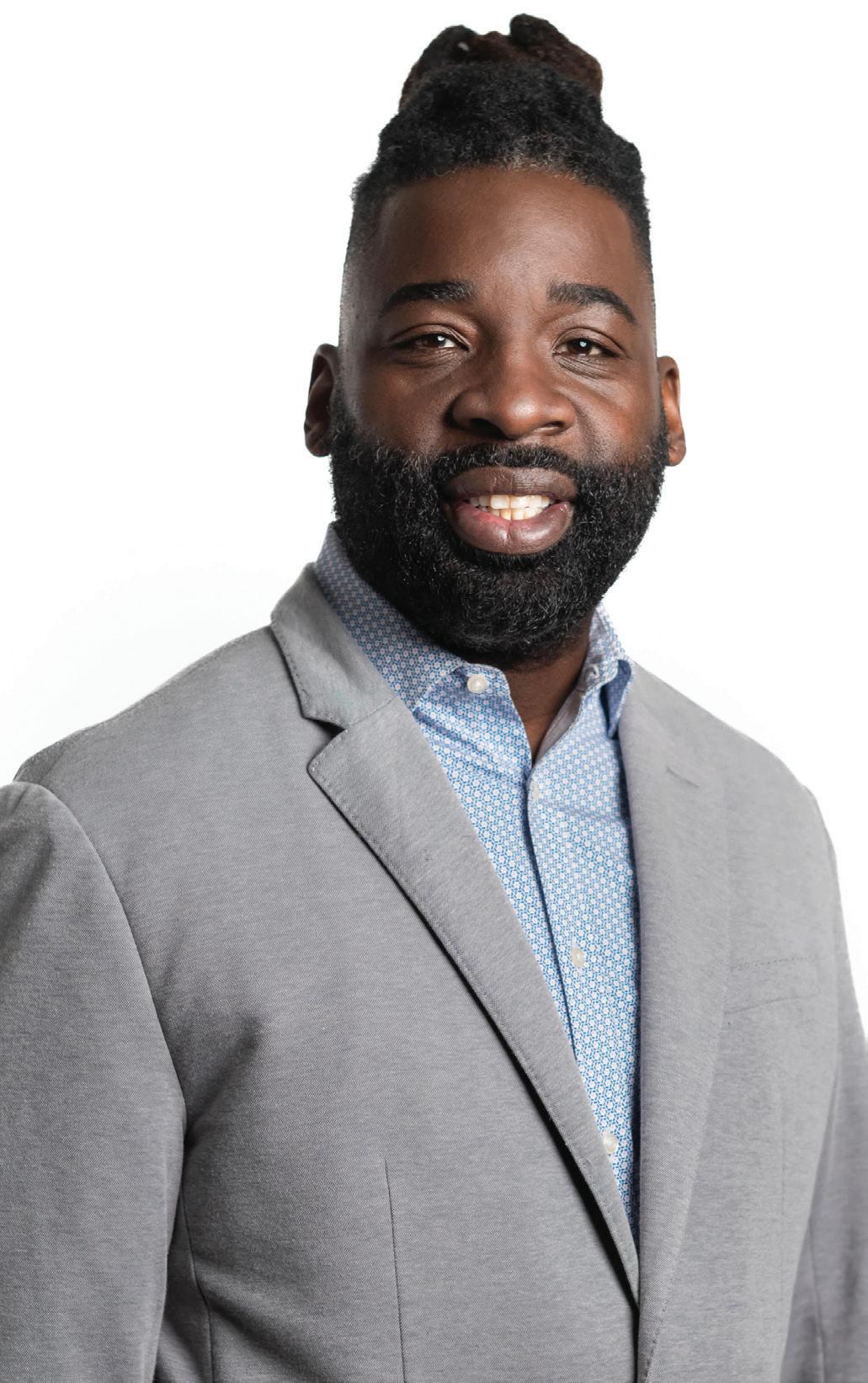
as a father, to discover my culture.”
Johnson sees the local food industry evolving and believes more culturally responsive options are vital. “I hope we will be able to disrupt the food
chain that’s happening in the Twin Cities for all the families, individuals and organizations that work with food, so that we can see more equitable access to culturally relevant foods,” he said.
Storehouse Grocer & Coffee operates as a workerowned business, offering each employee the option to become a co-owner. Staff members are paid $19 an hour, meeting the St. Paul living wage of approximately $40,000 per year.
“To work in a micro grocery store, I don’t think that’s a bad gig,” he said. Johnson believes the business model should be celebrated not just in Black communities, but by anyone who has been excluded from traditional economic pathways.
“Not everyone sees what the food industry can be for their lives,” he said. He also sees an opportunity for economic empowerment, pointing to the scale of the industries involved. “Minnesota’s food industry is worth $50 billion, and coffee is another $25 billion,” he said. “We own 9% of the GDP just in food sales.
“There is wealth in our food, and we need to make sure that we have it.”
Carl Johnson is a 2025 Bush Fellow. For more information, visit www.bushfoundation. org/2025-bush-fellows/.
Vickie Evans-Nash is a contributing writer for the Minnesota Spokesman-Recorder. Vickie welcomes reader responses at vnash@spokesman-recorder.com.



By Andrew Marshall
Let’s set the scene: It’s after hours. Your stomach is in knots, and you’re Googling symptoms like a detective on a crime show.
“Do I need the ER? Or urgent care? Can I just call someone in my pajamas? How much will this all cost?”
You’re not alone. One of the most common questions we hear about health plans is:
“Where do I go when I need care? And how much will I have to pay?”
The answers can save you time, money, and a lot of stress.
Emergency room
Go to the emergency room, or call 911, when a situation is severe or potentially lifethreatening. ERs are open 24/7 and equipped to handle critical medical issues. Go to
the ER if you experience:
• Chest pain or stroke symptoms (face drooping, slurred speech)
• Serious injury or uncontrolled bleeding
• Difficulty breathing or sudden confusion
Anything that makes you say, “This is really bad” likely warrants an ER visit.
Urgent Care
Urgent care is ideal when you need medical attention fast but it’s not life-threatening, especially after hours or on weekends. Visit urgent care for:
• Minor burns, sprains or cuts
• Fevers or flu-like symptoms
• Ear infections, pink eye or mild allergic reactions
Urgent care visits usually cost less than an ER trip and often have shorter wait times. Many insurance plans cover urgent care similarly to a regular doctor’s visit, but check your coverage first.
Telehealth or e-visits
Feeling under the weather but don’t want to leave your house (or your pet’s lap)? Telehealth can help with many common conditions, including:
• Sore throats, colds, allergies or rashes
• Prescription refills or follow-ups
• Mental health check-ins
Many health plans offer lowcost, or even free, virtual visits. Check your plan’s Evidence of Coverage to confirm availability and costs. If it’s included,


your insurer may even help you schedule an appointment through their website or app.
Your primary care physician (PCP) should be your go-to for non-urgent, preventive care.
PCPs:
• Know your medical and family history
• Provide vaccinations and regular screenings
• Help manage chronic conditions like high blood pressure or asthma
• Detect issues before they become serious. Insurers often promote PCP visits to help
improve long-term health outcomes and reduce overall costs.
Why your health plan cares where you go
It’s not just about controlling costs, it’s about getting you the right care in the right place.
• You avoid large out-ofpocket bills
• Emergency rooms stay open for true emergencies
• Premiums remain more affordable for everyone
True story: One person went to the ER for a paper cut. The result? A $1,200 bandage. Can it really cost that much? Yes, and here’s why.








ERs are built like five-star hotels for health care. They’re equipped for the worst-case scenario, whether you need it or not. That means more specialized staff (doctors, nurses, on-call surgeons), expensive equipment (CT scanners, trauma rooms), and round-theclock resources.
Even if your visit is for something minor, you’re paying for the full setup. Your insurance may cover some or most of the costs, but if the visit isn’t deemed medically necessary, you may pay more out of pocket. Most health plans have apps or phone
lines to help guide you before you go, use them!
Key reminders
• Check if the provider is in-network. Out-of-network care = higher costs
• Use your health plan’s app or nurse line for guidance. Many can help locate urgent care nearby, connect you with a virtual doctor, and estimate your out-of-pocket cost
The bottom line
Navigating the health care system can feel confusing. But knowing where to go for care shouldn’t be.
• If it’s a serious emergency, call 911 or go to the ER.
• If it’s urgent but not lifethreatening, try urgent care or contact your PCP.
• For minor issues or general concerns, telehealth or a nurse advice line is a great first step.
When in doubt, don’t guess. Ask.Checking in with your insurance plan before heading out can help you avoid surprise bills and get the care you need, faster. Because your health matters most, especially in the moments that matter.
The “Understanding Health Insurance” column is provided by Medica. The author, Andrew Marshall, is Medica’s Minnesota market president. Medica is a nonprofit health insurance company headquartered in Minnesota, serving communities across the Midwest. For more information, visit www.medica.com.


By Sheletta Brundidge
July is recognized as BIPOC
Mental Health Awareness Month, a time to highlight the unique mental health challenges faced by Black, Indigenous and People of Color.
For Adrianna Willis, promoting mental health isn’t limited to a single month. It’s a year-round mission she carries through her business, Mind the Crown.
Mind the Crown offers a curated line of self-care products, including affirmation cards, adult coloring books, mugs, purses and candles with positive messages. The brand also hosts special events focused on “restoring peace with fun and self-love.”
One standout product in Willis’s collection is a tote bag embossed with the message:
“This Bag Carries Boundaries.”
“It resonates,” she said. “I personally am a pleaser, but glanc-
ing at that message reminds me to stay true to my boundaries. Carrying that purse makes women feel more powerful. We don’t always communicate or maintain our boundaries, but when we do, it’s the greatest form of self-care.”
Willis said she hopes BIPOC Mental Health Awareness Month continues to reduce the stigma around seeking therapy, particularly in Black communities.
“In the Black community, people can be penalized or called crazy if they go to a therapist,” she said. “And we don’t want to look like we don’t believe in God or that He can’t heal everything. I believe in God, but I needed someone to talk to who wasn’t in my family.”
Mental health experts agree that BIPOC individuals, couples and families face unique challenges related to systemic racism, microaggressions, and generational
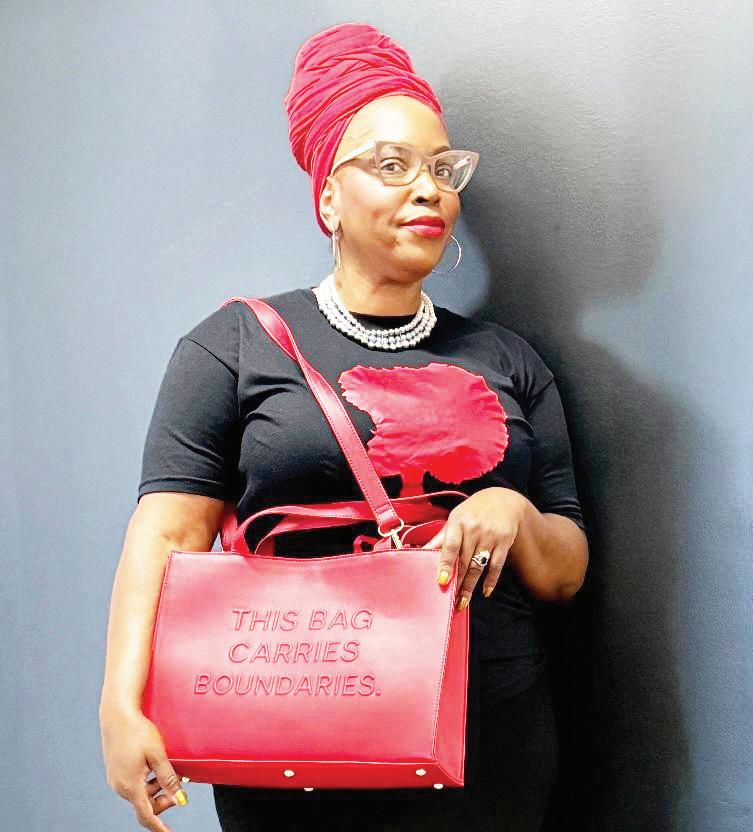
trauma.
“The well-known, sobering mantra that ‘you have to be twice as good to get half as much’ unfortunately conveys that any less-thanideal display of mental health proficiency could result in
By Shanasha Whitson
In an era when many entrepreneurs face barriers to launching and growing a business, one Minneapolis-based consulting firm is helping hundreds of small business owners break through.
Since opening its doors in 2017, McDavid Marketing, founded and led by Chanelle McDavid, has supported more than 300 small businesses across Minnesota, Chicago and Atlanta. Branded as Market With Chanelle, the boutique agency specializes in business formation, credit building, funding strategies, and digital marketing.
A graduate of Columbia University with a degree in marketing communications and international business, McDavid blends academic expertise with hands-on entrepreneurial experience. Her mission: to demystify business ownership and offer strategic, actionable guidance that fuels sustainable growth.

Founder of McDavid Marketing Chanelle McDavid Photo courtesy of McDavid Marketing
an unacceptable personal or communal setback,” said Lambers Fisher, a licensed marriage and family therapist, DEI trainer, and host of The Diversity Dude podcast. Fisher said he’s encouraged to see growing awareness
challenges, such as legal formation, business credit, and branding, and continue with the agency through scaling and expansion.
around the issue.
“It’s encouraging to have a specific month to spotlight an often unacknowledged or under-acknowledged experience in the BIPOC community,” he said. “We can use this time to empower and equip the community with mental health maintenance skills. Skills that can be nurtured, maintained and not just modeled but taught to the next generation.”
Willis agrees, adding that there’s no time like the present to encourage people of color to consider the benefits of therapy. “It’s okay to seek help and balance,” she said.
“I’ve been at low points in my life when I needed a therapist. We have to normalize this. We only get one vessel, and our mind controls our body. Therapy, along with prayer and community, will protect our peace.”
After 27 years working for a Fortune 250 company, Willis pivoted from her corporate career to launch and lead her own full-time business. Mind the Crown is designed especially with Black women in mind.
vid says her purpose remains steady: empowering entrepreneurs with clarity, confidence and strategy. “We’re not just building businesses,”
“We provide the tools, structure and confidence to help people take that next step, whether they’re just starting out or scaling up.”
As the company nears a decade in business, McDa-
she said. “We’re building legacies.”
“We carry a lot of people with our incomes. We hold a lot,” she said. “I’ve known too many women diagnosed with cancer in their 40s. We as women have a hard time being softer and letting our guard down. We need to rest and be in the moment, and we need help for that.”
“I’ve been at low points in my life when I needed a therapist. We have to normalize this.”
Sheletta Brundidge is a children’s author, an Emmy Award winning comedian, and a local activist. She is also a contributing writer for the Minnesota Spokesman-Recorder. For more information, visit www.shelettamakesmelaugh.com.
To learn more or get in touch, visit www.mcdavidmktg.com.
The column “Profiles in Power,” authored by Shanasha Whitson, is dedicated to highlighting mobilizers in the local community. She is the executive director of Community Partnership Collaborative 2.0 (CPC 2.0), a nonprofit health and wellness HUB. For more information, visit www.cpcmn.org.
“Starting a business can feel overwhelming and isolating,” McDavid said. “We provide the tools, structure and confidence to help people take that next step, whether they’re just starting out or scaling up.”
meeting the needs of entrepreneurs from diverse backgrounds and communities.
What sets McDavid Marketing apart, she says, is its focus on education and accessibility. The firm offers both in-person and virtual services,
Clients range from solo entrepreneurs to growing teams in industries including beauty, real estate, wellness, retail, and technology. Many come to McDavid Marketing for support with early-stage
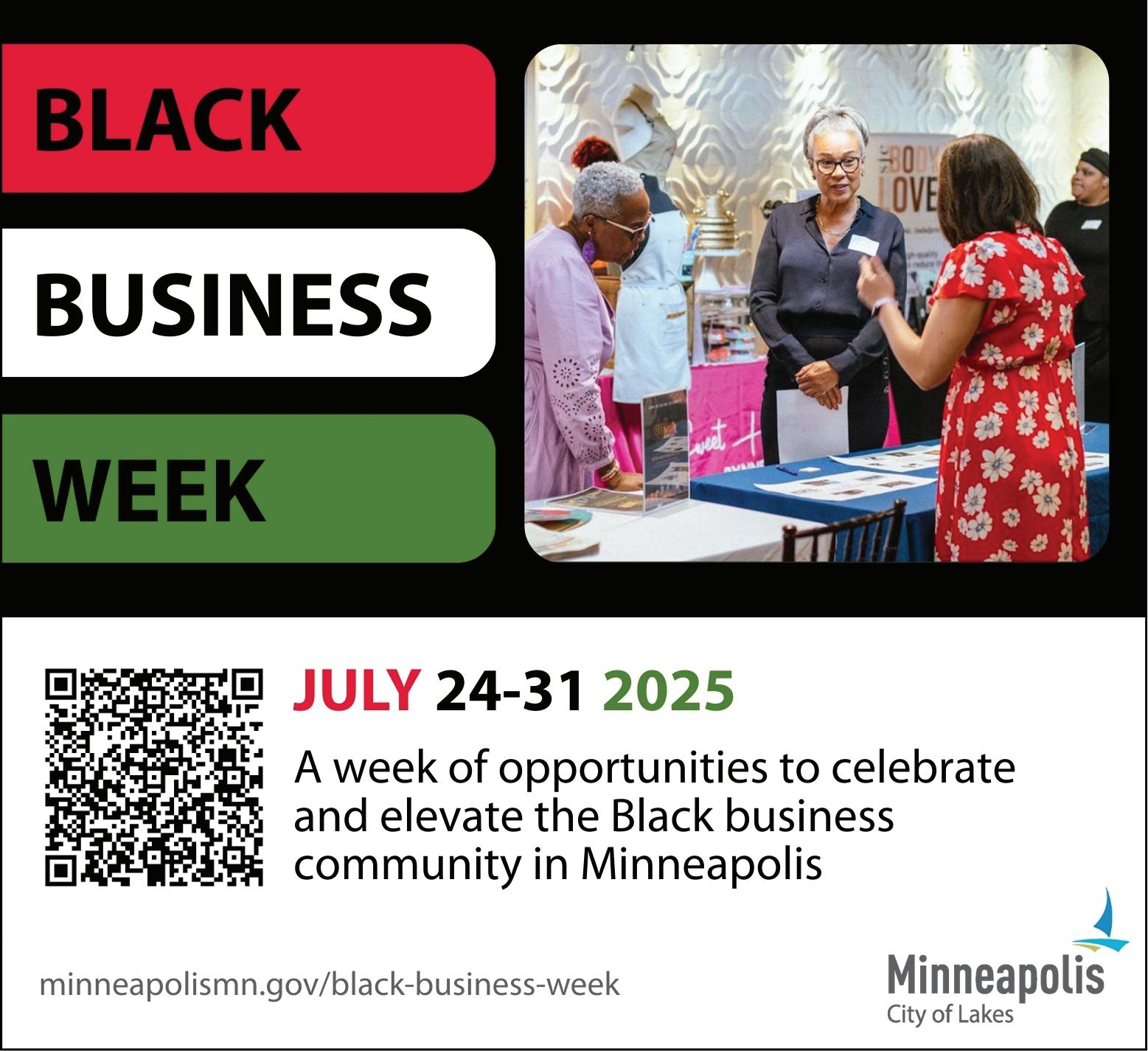

and rolls back protections for drinking water. It tells corporations they can dump, poison and profit without consequence. And who suffers? The same people who always suffer”: Black, brown, Indigenous, and low-income Americans.
Billions in promised grants at risk
Biden’s Inflation Reduction Act earmarked $2.8 billion in grants and $200 million in technical assistance to invest in underserved communities — “80 times more than any federal investment in environmental justice in history,”
“It is not an overstatement to say this is the most anti-environment bill in history.”
Chandra Taylor-Sawyer, senior attorney at the Southern Environmental Law Center, told Rolling Stone last year. While many grants have already been paid out (which hasn’t stopped the EPA from attempting to take that money back), a significant amount of funding through the program remains unawarded. In February, a report from the Center on Budget and Policy Priorities said that over $1 billion in IRA environmental justice funding has not yet been obligated.
The funding was supposed to remain available through September 30, 2026.
Lawsuits push back
The Green and Healthy Homes Initiative, which was named by the Biden administration as a regional grantmakers for the Thriving Communities Grantmaking Program, one of a number of ways that the EPA’s IRA funds were being distributed, was one of three plaintiffs in a lawsuit against the EPA filed earlier
this year after the agency tried to unilaterally cancel its block grant. The nonprofits won that suit last month.
“In the bill that went through the House and Senate, the Senate amended to not repeal obligated funds but only rescind non-obligated funds,” explains Ruth Ann Norton, president of Green & Healthy Homes Initiative (GHHI). “Our funds are obligated, as our fourth-circuit ruling deemed. The cancellation of those grants was unlawful, in the words of the judge.”
Fighting for communities
The Maryland-based GHHI is in the process of distributing its block grant to community-based organizations throughout the mid-Atlantic, the region the Biden EPA put
it in charge of. “We do have about 111 identified subrecipients, 72 of which are fully contracted and have already started to draw on payments,” Norton says. “The whole reason that we work through this dispute is simply to ensure that communities have funds to address issues of environmental quality and to advance public health.”
In another class-action lawsuit that was just filed in June, a similar argument is being made that the EPA can’t reclaim money that was congressionally allocated. That suit seeks to have some 350 previously awarded grants, totaling $3 billion, reinstated.
The end of an era?
While there’s a good chance that the legal argument will
win there too, and the awarded grants will remain rewarded, the funding that was still available is now likely dead and gone — and the all-too-short era of when the federal government made an effort to address climate justice, funneling billions of dollars into doing so, now seems even more squarely behind us.
“We can’t lose our focus on mission,” Norton said, “but I don’t have an answer entirely where we’re gonna go for all of the money, ‘cause even philanthropy doesn’t have enough money to backfill in many communities what government was otherwise funding.”
This piece was originally published in Word in Black. For more information, visit www. wordinblack.com.
Enforcement (ICE). Under the bill, ICE’s detention budget alone would explode from $3.4 billion this year to $45 billion by 2029, surpassing the combined funding of all federal prisons.
Public records show that ICE’s arrests of immigrants without criminal records have surged by more than 1,400% in the past year. The agency has repeatedly deployed masked officers and National Guard troops in workplace and community raids, tactics that critics say resemble authoritarian crackdowns.
The spending package also
authorizes the creation of a federal citizenship registry, combining Social Security and immigration data into the first centralized list of U.S. citizens. Officials claim the database will help election authorities verify voter eligibility, echoing Trump’s unsubstantiated claims of widespread immigrant voter fraud. Privacy experts have warned that this system amounts to a national surveillance apparatus launched without any public debate or congressional hearings.
“This level of integration among federal agencies handling sensitive personal data has never existed before,”
NPR reporters Jude JoffeBlock and Miles Parks reported. They noted that privacy advocates and even some
Not an isolated incident
By 2023, Shaheer said, leadership asked him to create consent forms that would violate HIPAA protections, allegedly to access the personal data of gunshot victims without proper authorization. “I was being asked to betray the very people I had promised to protect,” he said. “That was my breaking point.”
He left the institution in June 2023 and now runs a nonprofit called Innovative Solutions, which continues to support survivors of violence and expose harmful practices within health care systems.
Shaheer said he hopes the current spotlight leads to lasting change. “People inside that hospital are being traumatized, patients and employees. We deserve to be treated with dignity and respect, not punished for telling the truth.”
Reading from a written statement submitted by a current Black employee within Hennepin Healthcare’s health equity department, Levy Armstrong outlined similar concerns. The employee described being excluded from decision-making, denied merit increases, and forced to take mental health leave due to workplace hostility.
“What is particularly troubling,” the employee wrote, “is that my experience is not an isolated incident.”
Another anonymous employee, whose statement was read aloud by advocate Andrew Freck, said they faced harassment after raising budget concerns related to interpreter services under the equity department.
Nathan, a 15-year union employee in inpatient psychiatry, described being investigated for the “tone of his voice” after expressing concern over restraint use on Black patients. “Instead of addressing the disparities, they
conservatives have long opposed a government-run citizenship roster.
Polling from Pew Research shows that most Americans oppose several core pieces of Trump’s immigration agenda. Sixty-one percent reject the deportation of immigrants to prisons in El Salvador. Fiftyfour percent disapprove of increased workplace raids. Yet a growing share — 56% — now supports expanding the border wall with Mexico, a rise from 46% in 2019.
Inside the Republican Party, support for Trump’s enforcement push is nearly unanimous. Eighty-eight percent of Republicans favor expanding the border wall. Further, 81% back using state and local police to help deport immigrants. Among Democrats, over-
tried to silence me,” he said.
Eiko Mizushima, the former executive chair of the hospital’s Asian Collective, shared her story of harassment and retaliation after reporting misconduct by an executive. “If you report harassment by someone in leadership, their friends won’t look closely,” she said.
“The investigation we’re asking for is not only a legal imperative, it is a moral one. The public is watching.”
A current medical assistant and union steward added: “If you’re white, you’re treated fairly. If you’re Black or Hispanic, you’re treated partially. Many just quit due to retaliation. It’s real.”
A call for accountability Simmons originally sub-


whelming majorities oppose the policies, with only 27% supporting any expansion of the wall.
Alcatraz” merchandise. Historians have noted that such imagery recalls Jim Crow-era propaganda depicting Black
“‘One Big Beautiful Bill,” known by Democrats as the ‘One Big Ugly Bill,’ is set to dismantle central pillars of the American social safety net and create the most expansive immigration enforcement system the country has ever seen.”
The bill’s most controversial provisions have drawn condemnation after Trump visited a new detention facility in the Everglades, where he joked that alligators and snakes would attack any immigrant attempting to escape. The Florida Republican Party has since begun selling “Alligator
children as bait for alligators — a tactic used to dehumanize and terrorize Black communities.
Nevada Democratic U.S. Rep. Steven Horsford called the legislation a direct attack on the health, safety and dignity of Black communities across this country. “Stripping away Medicaid coverage while throwing billions into an unaccountable immigration dragnet is not fiscal responsibility — it’s reckless extremism,” Horsford said.
“We will not be silent as this Congress tries to reverse decades of progress and push people further into poverty and fear.”
This piece was originally published in The Washington Informer. For more information, visit www.washingtonreformer.com.
Despite widespread criticism, Trump has pressed forward with the measure, calling it a fulfillment of his longstanding promises. “This is going to be the bill that finally puts America first,” Trump said during a rally in Florida. “No excuses.”

mitted a formal request for investigation to the Hennepin County Board on May 9. The board’s inaction, he said, prompted the press event.
“Let me be clear,” Simmons said. “The investigation we’re asking for is not only a legal imperative, it is a moral one. The public is watching. The workforce is waiting. History will remember how you respond.”
Speakers emphasized that
these allegations reflect institutional failures, not isolated HR issues. They closed the event with a call for “justice over control, equity over hierarchy, healing over harm.”
“We’re not just calling out injustice,” Simmons said. “We’re calling forth a better future… one where care, not control, is the foundation of this hospital’s culture. Because no one should be punished for doing the right thing.”
Community leaders vowed to continue organizing, pressuring the County Board, and amplifying stories like Shaheer’s to ensure transparency and accountability within one of Minnesota’s largest health care institutions.
HCMC declined to comment prior to MSR’s deadline.
Jasmine McBride welcomes reader responses at jmcbride@ spokesman-recorder.com.

It’s also one of the most expensive seasons to travel. With warm weather, school breaks and slower work schedules encouraging many to hit the road or book a flight during the summer months, prices for flights, hotels and destinations often reach their peak, which could put a damper on your dream vacation plans.
If you’re looking to get away and maximize your time out of office, these tips and tricks can help make seeing the world, or even just the U.S., a bit more affordable.
Start saving & take advantage of travel perks
Planning your vacation can start any time simply by saving money for your travel expenses. Look at where your money is currently going and see if there are items you can cut, such as subscriptions, entertainment and dining out.
Don’t underestimate the power of credit card points –they can make travel more rewarding and help offset costs. Explore the travel rewards your credit card offers. Travel cards can help you build up miles or rewards points to put toward flights, hotel stays or rental cars by rewarding you for everyday purchases.

Timing is everything If your plans are more flexible, you may also want to consider traveling during the offseason for lower prices. Think about traveling in the month or two on either side of the peak season when tourists are less likely to visit. Whenever you travel, however, aim to book plane tickets about two months in advance, and start looking up flights as early as possible to get the lowest prices.
Sign up for airline price drop alerts and follow airlines via email newsletters and social media to keep atop any deals. Check for package deals as well, as airlines and hotels

will often offer package deals at a discount to make sure no seats or rooms go empty.
As you make your itinerary, look for discounts at popular destinations. Many museums offer free tickets on certain days or at certain times of the day. Ticket and booking deals are often available for members of certain professions, such as education, health care and the military. Other cities offer museum passes that allow you to visit multiple museums for a flat rate.
Know what to skip
Once you’re at your destination, consider passing on expensive guided tours or private transit like taxis or ride


shares. Instead, create your own city tour, look online for free walking tours or get around on public transportation.
If you’re visiting a popular monument or famous street, pass the “tourist trap” stores and restaurants and do your shopping and dining a few blocks away where prices are likely to be lower.
Broaden your horizons
Sometimes, you can have more fun at a lesser-known destination. Try some smaller towns over big cities, which can offer better prices on your hotel and dining experiences. Additionally, if you’re within driving distance of a big city,
you can still go and enjoy it for a day. If you are staying in a larger area, find a hotel outside of the most expensive part of the city but close enough that you’re not spending much getting to the sights.
Plan a staycation If a big trip still isn’t in your budget, that’s OK. There are still plenty of ways to get away, even if you stay in the comfort of your own home.
Take a day trip to a nearby town or plan a longer road trip through your state. You’ll still get to see new places and try new hotels. If you’re planning to visit a friend or family member, explore a new venue while you’re in that town. Exploring lesser-known destinations can offer unique charm without the usual crowds and costs.
The U.S. also has extensive state and national park systems with a reasonable percar entrance price. To save even more money, bring a picnic!
For more financial health tips, visit chase.com/financialgoals.
For informational/educational purposes only: Views and strategies described on this article or provided via links may not be appropriate for everyone and are not intended as specific advice/recommendation for any business. Information has been obtained from sources believed to be reliable, but JPMorgan Chase & Co. or its affiliates and/ or subsidiaries do not warrant its completeness or accuracy. The material is not intended to provide legal, tax, or financial advice or to indicate the availability or suitability of any JPMorgan Chase Bank, N.A. product or service. You should carefully consider your needs and objectives before making any decisions and consult the appropriate professional(s). Outlooks and past performance are not guarantees of future results. JPMorgan Chase & Co. and its affiliates are not responsible for, and do not provide or endorse third party products, services, or other content.
Deposit products provided JPMorgan Chase Bank, N.A. Member FDIC. Equal Opportunity Lender.
The bottom line Travel enriches our lives, and with some creative planning, you can enjoy memorable adventures without overspending. Using budget travel tips can help you add adventure to your life this summer without breaking the bank. Have fun finding strategic ways to cut costs while still having an enjoyable and fulfilling trip.
© 2025 JPMorgan Chase & Co.






website, or email admin@spokesman-recorder.com.
By Tiffany Johnson
“We’re off to see the Wiz-
ard!” said David Billingsley, Twin Cities musician and Grammy-nominated music educator, as he prepared to head to Culver City, California, home of TikTok’s U.S. headquarters and the historic MGM Studios where “The Wizard of Oz” was filmed.
This past June, Billingsley and a close group of collaborators celebrated a new partnership with TikTok, one he says has transformed his life and artistry and could open doors for countless other creatives in Minneapolis and beyond.
The partnership comes as more artists turn to digital platforms and emerging tools such as generative AI and smart distribution to build sustainable careers and connect with global audiences.
A musical legacy
Billingsley, a classically trained pianist based in Minneapolis, is best known as a touring keyboardist for Stok-
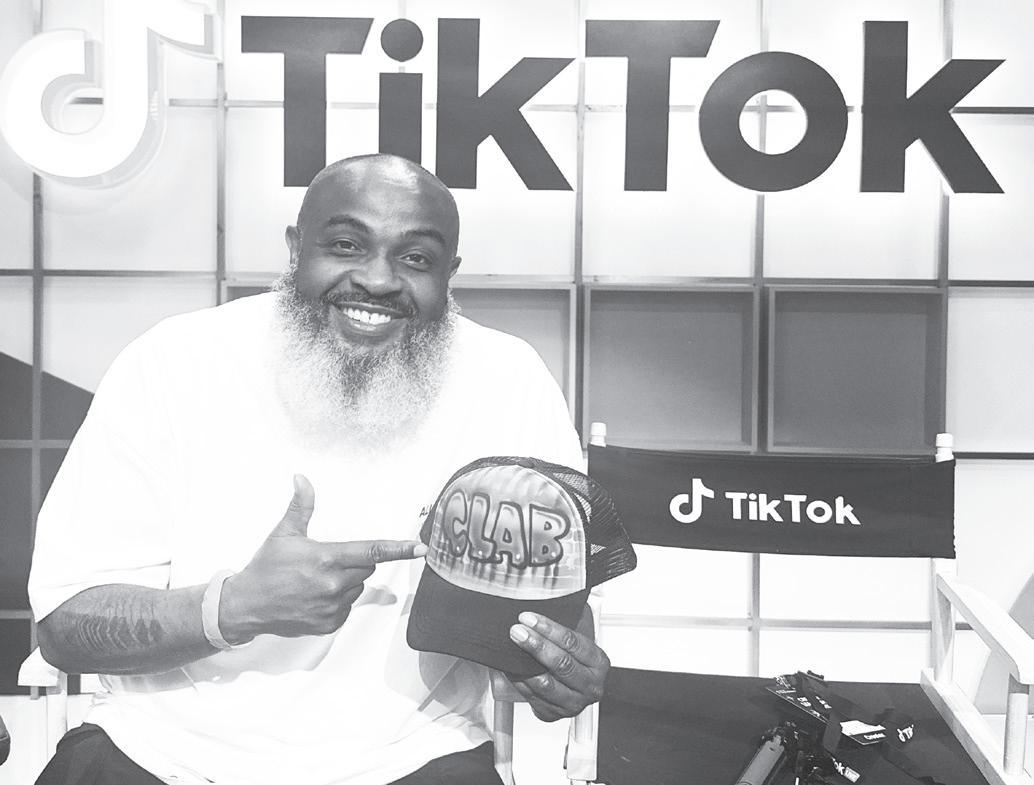
ley of Mint Condition. He’s also an independent artist with a discography that honors his family’s legacy. His albums include “Hymns From Grandma’s Living Room” (2020) and “House of David” (2020), the latter dedicated to his late father. He followed up with “Hymns From Mama’s House: Family Reunion” (2022), a tribute to his mother after her passing.
tions of childhood classics like “Mary Had a Little Lamb” and “Row, Row, Row Your Boat.” Billingsley also serves as the music teacher at DeLaSalle High School in Minneapolis, succeeding longtime educator Mark Cappechi, who held the role for 35 years.
From MSP to TikTok fame
For the past two years, Billingsley has performed regularly at Minneapolis-St. Paul International Airport (MSP); a gig he describes as a spiritual calling.
I built something real from playing piano at the airport to sharing moments on TikTok. I now have more than 14,000 followers and a fan base.”
Introducing CLAB
This spring, TikTok reached out to Billingsley with an opportunity to establish an official Creator Network, designed to onboard diverse artists, entrepreneurs and creatives into the platform’s creator economy.
Streaming with purpose
“People aren’t letting their lights shine. They think they are, but they’re not reaching the world at all.”
Earlier this year, he released “Just for Kids,” a project created in collaboration with his children, Cadence, Kaden and Sarah, featuring soulful rendi-
“It still receives spins to this day,” Billingsley said. “People love those songs.”
“I just always walked past that piano,” he said. “I traveled a lot, and it felt strange. Like, why is that piano just sitting there like that? God called me to that piano.”
While playing at MSP, Billingsley crossed paths with celebrities including Chance the Rapper and comedian Mike Epps, but it was livestreaming that shifted his trajectory.
“I began streaming, waking up at 4 a.m. faithfully to catch the train to the airport with zero followers,” he said. “Driven by grief, passion, and bold ideas,
By Jasmine McBride
Associate Editor
On a mission to bridge cultural gaps through sound, Nigerian-American artist and producer Obiora Obikwelu, better known as Obi Original, released his latest single, “Who Man Dem? (We Never Reconcile),” July 11; a fiery declaration of identity, pride, and pan-African truth.
Rooted in the rhythmic richness of highlife music and shaped by the complexities of diasporic belonging, Obi’s music is more than entertainment: It’s testimony.
“This isn’t just a track. It’s an affirmation,” Obi told MSR. “A confirmation of my purpose. A refusal to let the disconnection in the diaspora go unnamed.”
Raised in a Nigerian household where highlife and Fela Kuti played on repeat, Obi’s earliest influences were ancestral. While many of his peers were just discovering Afrobeats, he was already tuned into its origins. It wasn’t until college at St. John’s University in Collegeville, MN, that his musical

curiosity shifted into action.
“I came home from school one weekend, my mom was out of town, and I turned the house into a studio,” he recalled. “That night, I recorded Ndidi. That was over a decade ago, and I knew right then, this is what I’m meant to do.”
A soundtrack to the diaspora Known for his layered production and genre-blending artistry, Obi Original cofounded Ozone Creations, an Afrocentric media collective turned LLC in 2019. Through its recording division, Ozone Sound Labs, he engineers and produces for local and international artists across genres, Afrobeats, R&B, hip hop and soul, but always with an Afrorooted base.
His live band, Black Atlantics, is the physical manifestation of that philosophy, channeling the power of African music through live instrumentation, ancestral homage, and contemporary sonic exploration.
“Think Prince and the Revolution,” he explained. “Black

Atlantics is, to me, what the Revolution was to Prince: a vessel. When I play live, I’m playing both original compositions and covers of foundational African tracks. It’s a way of passing on the legacy.”
With past projects like “Tsunami,” “No Talkin’,” and “Melindago,” Obi has built a discography that swings from modern Afrobeats to deep-rooted highlife and Afro-jazz. But in 2025, he’s stepping further into the griot role — prioritizing heritage, healing, and truth-telling over algorithmic trends.
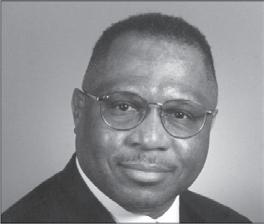
Baptist Church Rev. Doctor Charles Gill 732 W. Central Ave., St. Paul, MN 55104 Sunday Worship Service: 9:45 am
School: 8:45 AM

“Who Man Dem?” and the call for reconnection
His single “Who Man Dem?
(We Never Reconcile)” is bold and intentional, born out of frustration with performative unity across the diaspora.
“There’s still tension, still misunderstanding. We’ve had surface-level connections, but no true reconciliation,” he said.
“This song is about asking, ‘Who are the ones who doubt my belonging, my purpose, my place?’ And then answering them, with rhythm and clarity.”
He named it CLAB, in honor of his late mother, Carol Louise Adell Bostic. Pronounced like “collab,” the initiative offers onboarding, training and support for creators looking to grow their platforms and monetize their work.
CLAB is currently Minnesota’s only TikTok Creator Network. On July 8, TikTok named it a Top Program Partner for its outstanding recruiting and impact.
“At CLAB, we’re not just teaching you how to stream,” Billingsley said. “We’re providing the blueprint to build a creative life on your own terms, whether you want to quit your nine-to-five, travel the world, or make real money from your art.”
The program is free and fully supported by TikTok.
Drawing on British slang, pan-African philosophy, and sonic elements of classic highlife, the song is both a critique and a celebration. It’s not a diss track. It’s a mirror, one that urges listeners to look deeper into their lineage and re-examine their conditioning around identity.
“If you say you’re not African because you’ve been here for generations, what happens when your descendants say the same about you? When we forget who we are, we disrespect those who came before us.”
More than music: A mission
What keeps Obi Original grounded and energetic isn’t just music: It’s “knowledge of self.” Raised with a deep reverence for his heritage, he has long understood the importance of honoring his ancestors not just in ritual, but in rhythm.
“My guitar is my chalkboard,” he said. “I could lecture, or I could play. When I play, people feel something ancient move through them. That’s spiritual. That’s ancestral.”
Obi sees music as the original African social media. Before likes and shares, there were drums and voices, carrying messages and gathering
Billingsley believes platforms like TikTok are no longer optional; they’re essential for artists hoping to thrive in the digital age. “We’re on the frontier of a brand-new horizon, a new way of life and industry,” he said.
His mission with CLAB is to empower creators to think critically and boldly about their careers and how they reach audiences. “The real talent ain’t shining,” he said.
“People aren’t letting their lights shine. They think they are, but they’re not reaching the world at all.”
Amid ongoing discussions about a possible U.S. sale of TikTok, Billingsley views the CLAB Creator Network as a timely platform to help creators launch and grow.
Signing up for CLAB Creator Network is free. Billingsley encourages any creatives interested in joining or learning more about CLAB to visit: www.billingsleymusic.com/clab.
Tiffany Johnson is a contributing writer with an arts and culture focus.
communities.
“Music was how we organized, how we healed, how we told our stories. That’s why I don’t separate my artistry from myself. I am the message.”
“If you say you’re not African because you’ve been here for generations, what happens when your descendants say the same about you?”
Catch him live Obi Original’s next single “Who Man Dem? (We Never Reconcile)” drops ahead of his upcoming project set to release in August 2025. He’ll headline a major show at The Hook and Ladder Theater in Minneapolis on August 15, featuring DJ Kwey of Samambo, and poet Brandyn Lee Tulloch.
You can also catch him performing with Black Atlantics at Aquatennial Minneapolis on July 26.
To connect with Obi, visit www.ozonecreationsmn.com/ obioriginal, or follow him on social media @obioriginal.
Jasmine McBride is welcomes reader responses at jmcbride@ spokesman-recorder.com.

By Lawrence Ware
Essence Festival of Culture is a yearly celebration of Black culture that people look forward to every July 4 weekend. It’s so popular that the movie “Girls Trip” made it a plot point in the film. Usually, attendees leave raving about how much fun they had…but not this year.
First there was a difference that people noticed when they arrived at the convention center. Hardly anyone was there.
is mostly one-sided because we pay little attention to the negative comments from our brothers and sisters from the Motherland.
But this year’s Essence Festival has many talking about it, because what was once a celebration of Black American culture this year turned into something else.
and Black people in America to see their destinies intertwined. Du Bois wrote that neither community would overcome anti-Blackness without the help of the other.
By Mustafa Ali
This week, water did what it always does. It moved — fast, furious, and unforgiving. In Texas, it tore through homes like a thief in the night. In New Mexico, it swallowed roads and memory alike. In North Carolina, it filled lungs that once screamed with laughter.
The death toll isn’t just measured in numbers. It’s carved into the land, etched in the grief of survivors, and soaked into the silence of those who never made it out.
Unfortunately, we still ask the same tired questions after each disaster, as if surprise is an excuse for inaction. How did this happen? How could this be?
But deep down, we already know the answer. The floods are not freak occurrences. They are the price tag of delay, denial, and political convenience. They’re the result of pretending nature’s warnings are just background noise.
We are not in an age of natural disasters — we are in an age of unnatural ignorance.
Let’s be brutally honest: We have altered the atmosphere. We’ve thickened the sky with our pollution, heated the oceans, and stripped the land bare for profit.
When we turned wetlands into parking lots and rivers into sewage drains, we didn’t just build cities — we built graves. We have made the climate a loaded gun, and now we gasp every time it fires.
A deadly new reality
“We are not powerless. We are just paralyzed by convenience.”
What happened in Texas wasn’t just rainfall. It was revenge. Not by a vengeful god or mystical force, but by a system that’s been pushed beyond its limits. As the climate crisis grows, we are seeing clouds holding more water than they were supposed to. That soil can’t absorb what it once could. That creeks become monsters not because they want to, but because they have no choice. And here’s the hard truth: This is just the beginning. The 500-year and 1,000-year floods are now happening every few years. We are now facing a deadly new reality. We no longer have the luxury of calling this “extreme weather.” It’s just weather now. And if we don’t evolve, survival will become the exception, not the rule.
But change doesn’t come easily in a country addicted to comfort.
We scroll past flooded towns while sipping coffee made from water that, in some parts of the world, is more valuable than gold. We elect leaders who kiss the ring of fossil fuel CEOs while entire communities drown. We let misinformation bloom like algae in a warming lake — thick, toxic, and choking the life beneath it. Are we willing to evolve to

submissions@spokesman-recorder.com
submissions@spokesman-recorder.com
ads@spokesman-recorder.com
submissions@spokesman-recorder.com.
save lives from floods? That’s the question staring us down like a rising tide. Evolution here doesn’t mean growing gills or building higher dams — it means something far more radical. It means rethinking what we value.
It means making science sacred again. It means investing in infrastructure that puts people before profits, and listening to Indigenous communities who’ve known how to live in balance with nature for centuries.
It means refusing to call flooded trailer parks in Ingram, Texas, a tragedy without also calling out the policy decisions that made those families vulnerable in the first place. It means recognizing that climate justice and racial justice are braided together like roots beneath a cypress tree. Because the floods don’t discriminate, but the systems that leave people to drown do.
Evolving means we build not just for today, but for the storms of tomorrow. We need climate-resilient housing, early warning systems that reach every ZIP code, and elected officials who don’t wait for polling numbers to rise before they act. We need to stop pretending adaptation is optional.
Every delay is another obituary
For those who still deny what’s happening — for those who claim it’s too expensive to address climate change — I ask: how expensive is a child’s life? How costly is the sound of a mother’s scream echoing through waterlogged ruins?
We are not powerless. We are just paralyzed by convenience.
But history remembers the moments when we chose to evolve. This is our transformational moment as an American family, when we can sacrifice a small bit of comfort for collective survival. When we finally see a threat not as an end, but as a call to something higher. The floodwaters will recede, but the question will remain: Did we rise, or did we retreat?
The clock is dripping. The levees are learning our names. And the only thing left to decide is this: Will we keep drowning in denial?
Or will we finally learn to breathe as if every life depends on it? Because it does.
Dr. Mustafa Ali is a poet, thought leader, strategist, policymaker and activist committed to justice and equity. This piece was originally published in Word in Black. For more information, visit www.wordinblack.com.
Then there was drama with the music. First Lauryn Hill performed nearly two hours late and came out to a very small crowd… though for a change, the tardy performance wasn’t actually Miss Hill’s fault.
Then there was the Stephanie Mills debacle. She was so underwhelmed by the professionalism of the festival that she wrote an open letter decrying the organizers.
But let’s be real…we all know what everyone is talking about: The tension between Black Americans and Africans that the festival put on Front Street this year.
I’ve written about this before. For years there has been a rift between Black Americans (the descendants of slaves) and Africans (first or second generation immigrants from the continent.) To African Americans, the rift
“I agree with the notion of trying to unite Africans and Black Americans. But the Essence Festival is not the place to try to accomplish this.”
Many have rightfully pointed out that Caroline A. Wanga, a Kenyan citizen, is the current president & CEO of Essence Ventures. They imply (well, say with their chest) that her being at the helm of the company is why the festival took a more Pan-African turn and tried to celebrate global Blackness instead of the distinctly American version of it. There is certainly a need to try and unite Africans and Black Americans. We are more alike than we are dissimilar. And we would be wise to remember that.
Marcus Garvey, Stokely Carmichael and W.E.B. Du Bois all talked passionately about the need for Africans
I’m the associate director of a Center for Africana Studies at a university, so I agree with the notion of trying to unite Africans and Black Americans. But the Essence Festival is not the place to try to accomplish this.
This festival has historically been a place where the culture of Black Americans is celebrated. The hard left turn into celebrating all Blackness is fine if you do not pull back on the celebration of Black people in this country. That’s where this year’s festival went wrong.
The noble effort to try to have a festival that celebrates the beautiful complexity of the people in the African Diaspora fell short. Black Americans felt left out. Many are claiming they will never go again. Essence better get its act together and learn from what went wrong this year. People are writing obituaries for the quintessential July 4 cookout. If they don’t fix it quick, fast and in a hurry, this celebration of Blackness will be little more than a memory.
This piece was originally published in The Root. For more information, visit www.theroot.com.
By Dr. Benjamin F. Chavis, Jr.
President Donald Trump’s housing policy is shaping up to be both an economic and humanitarian disaster, and if leaders across the political spectrum don’t act soon, the damage may be irreversible.
To be clear, housing policy was already broken long before Trump returned to office. But instead of tackling the root causes, like the chronic shortage of Section 8 vouchers and affordable units, some policymakers chose to blame tools like rent-pricing software, which simply reflect the market’s conditions.
Rather than confront the real barriers to affordability, politicians have chosen to target the messenger. That never made sense, and it still doesn’t, a point that Democratic Governor Jared Polis made clear last week by vetoing a bill to ban such technology. If we want lower rents, we don’t need to ban software that reports current prices. We need to build enough housing so the data reflects abundance, not scarcity.
Unfortunately, President Trump has not gotten this memo, and he is making our broken housing system worse. He has already driven up lumber prices with protectionist trade wars and targeted immigrant communities who make up a vital part of the construction workforce. Now the president is laying the groundwork for another housing crisis that could rival 2008.
In late May, Trump announced he is “giving very serious consideration” to taking Fannie Mae and Freddie Mac public again. These government-backed mortgage giants
were central players in the last financial collapse. Under pressure to expand homeownership without oversight, they helped inflate the subprime mortgage bubble. Ten million Americans lost their homes. The institutions got bailed out. Families didn’t.
To prevent that kind of disaster from recurring, the government placed both firms under conservatorship. Releasing them now would create the same reckless incentives that crashed the global economy, and it would benefit deep-pocketed investors just in time for the 2026 elections.
parties should reject this approach and unite around a new vision: one that builds.
Writers Ezra Klein and Derek Thompson call this the “abundance agenda.” In their book “Abundance,” they challenge local, state and federal leaders to confront the self-imposed zoning restrictions and regulatory delays that have made it almost impossible to build enough housing.
“You cannot be the party of working families when the places you govern are places working families can no longer afford to live,” Klein wrote. That means reforming exclu-
“If leaders across the political spectrum don’t act soon, the damage may be irreversible.”
When the next economic crash comes, everyday Americans, and especially Americans in underserved communities, will be the ones paying the price. And it doesn’t stop there.
Trump’s proposed budget would cut federal rental assistance by about 40% at a time when nearly half of renters are spending more than a third of their income on housing. “We would see, I think, homelessness escalate in a way that has been really unprecedented,” warned Kim Johnson of the National Low Income Housing Coalition.
Remaining funds would be handed to states as “block grants,” echoing past efforts to gut safety net programs through decentralization and attrition. This is not a serious answer to the housing crisis.
It’s an ideological move that risks deepening inequality and instability that will result in a type of “housing apartheid.” Policymakers from both
sionary zoning, streamlining permitting, and shifting the political culture that demonizes developers while ignoring demand. It means prioritizing supply, not just subsidies.
Because if we don’t solve the housing crisis ourselves, voters will turn to anyone who claims they will, even if the solutions are fake or destructive. The values are already there. What we need now is strategy and action.
Increasing housing affordability and availability isn’t just good policy. It’s the only way to keep working Americans housed, the economy stable, and America’s future secure and inclusive.
Dr. Benjamin F. Chavis, Jr. is president and CEO of the National Newspaper Publishers Association. This piece was originally published by the National Newspaper Publishers Association. For more information, visit www.nnpa.org.
A/1 Contract No. 26-062
INVITATION TO BID
NOTICE OF INFORMAL APPOINTMENT OF PERSONAL REPRESENTATIVE AND NOTICE TO CREDITORS
Sealed bids will be received by the Public Housing Agency of the City of Saint Paul at 200 East Arch Street, St. Paul, MN 55130 for LED LIGHTING UPGRADES AT DUNEDIN HI-RISE, Contract No. 26-062, until 3:00 PM, Local Time, on Wednesday, August 6, 2025, at which time they will be publicly opened and read aloud via the Teams App. Bids may be submitted electronically, in a pdf format, to Northstar Imaging, www.northstarplanroom.com, or may be delivered as sealed bid to the address above.
A Pre-Bid Conference will be held on Wednesday, July 23rd, at 11:00 AM, local time, at DUNEDIN HI-RISE, 469 ADA STREET S, SAINT PAUL, MN 55107
A complete set of bid documents is available by contacting Northstar Imaging at 651-686-0477 or www.northstarplanroom.com, under public plan room, LED LIGHTING UPGRADES AT DUNEDIN HI-RISE, Contract No. 26-062. Digital downloads are no charge. Contact Northstar for hard copy pricing. Bids must be accompanied by a 5% bid guarantee, non-collusive affidavit, EEO form and Minnesota Responsible Contractor Compliance Affidavit. The successful bidder will be required to furnish both a satisfactory performance bond and a separate payment bond.
From Ads Department/MN Spokesman-Recorder
DevSecOps Engineer: Plymouth, MN
PHONE: 612-827-4021
From Ads Department/MN Spokesman-Recorder
IT Company seeks DevSecOps Engineer to integrate security practices into DevOps workflows, automate security checks, and ensure the safety of cloud infrastructure. Work closely with development and security teams to enhance the security posture of applications and systems. Build and Configure delivery environments by using CD/CI, Agile delivery methodologies. Create and assist in performing various types of tests. Perform troubleshooting. Generate customized reports. Offered Salary: $116,480.00 to $116,500.00/yr. Send resumes to: HRD, VITS Consulting Corp., 14264 23rd Ave N, Plymouth, MN 55447. Minnesota Spokesman-Recorder July 10, 2025
FOR BILLING INQUIRIES & TEARSHEETS
Phone: 612-827-4021
PLEASE CONTACT
ACCOUNTING DEPT
BILLING@SPOKESMAN-RECORDER.COM
PROBATE
2 WEEK RUN FLAT RATE $215.00 PREPAID
From Ads Department/MN Spokesman-Recorder
PHONE: 612-827-4021
FOR BILLING INQUIRIES & TEARSHEETS
PLEASE CONTACT ACCOUNTING DEPT
ASSUMED NAME FLAT RATE $215.00 2 WEEK RUN
Please proof, respond with email confirmation to ads@spokesman-recorder.com
S., Minneapolis, MN 55406 as personal representative of the estate of the above-named decedent, has been made. Any heir, devisee or other interested person may be entitled to appointment as personal representative or may object to the appointment of the personal representative and the personal representative is empowered to fully administer the estate including, after 30 days from the date of issuance of letters, the power to sell, encumber, lease or distribute real estate, unless objections thereto are filed with the Court (pursuant to Section 524.3-607) and the Court otherwise orders.
FOR BILLING INQUIRIES & TEARSHEETS PLEASE CONTACT ACCOUNTING DEPT BILLING@SPOKESMAN-RECRDER.COM
609.48 as if I had signed this document under oath.
SIGNED BY: Jennie Baltutis
Please Note: New email address for all future ads is ads@spokesman-recorder.com
The MSR handles billing digitally. This means you will get e-tears and e-mailed invoices unless you specifically request a hard copy.
The PHA reserves the right to reject any or all bids or to waive any informalities in the bidding.
EMAIL FOR OFFICIAL NOTICES: jcbaltutis@gmail.com Minnesota Spokesman-Recorder July 17, 24, 2025
The MSR handles billing digitally. This means you will get e-tears and e-mailed invoices unless you specifically request a hard copy.
LEGAL NOTICES
AN EQUAL KA YANG
OPPORTUNITY AGENCY PROJECT LEADER (651) 292-6089
Notice is further given that ALL CREDITORS having claims against said estate are required to present the same to said personal representative or to the Probate Court Administrator within four months after the date of this notice or said claims will be barred.
KA.YANG@STPHA.ORG
Minnesota Spokesman-Recorder July 17, 2025
Dated: June 24, 2025 Lindy Scanlon Registrar
Architectural Staff (Historic/Urban) Level I
ProSe Sara Gonsalves District Court Administrator Minnesota Spokesman-Recorder July 10, 17, 2025
AWH Architects, LLC, Minneapolis, MN, Req. Bach. or higher in environmental design, architectural design, or rel. design degree, & 1 yr. of exp. as a Project Designer or similar position. Hybrid work schedule permitted at employer’s discretion. Salary: $60,424/yr. For confidential consideration & additional reqs, send resume to Lawrence Black at lawrence awharchitects.com.
No agencies or phone calls please.
VIEW
Continued from page 10
the Washington Wizards and the WNBA’s Washington Mystics.
Finally…
Minnesota was well represented here either on the court or in the stands: retired pros Khalid El-Amin and Tamara Moore were there, as was WCCO Nighttime Host Henry Lake. Tre Holloman was there watching his former high school teammate Curtis Jones competing for Denver.
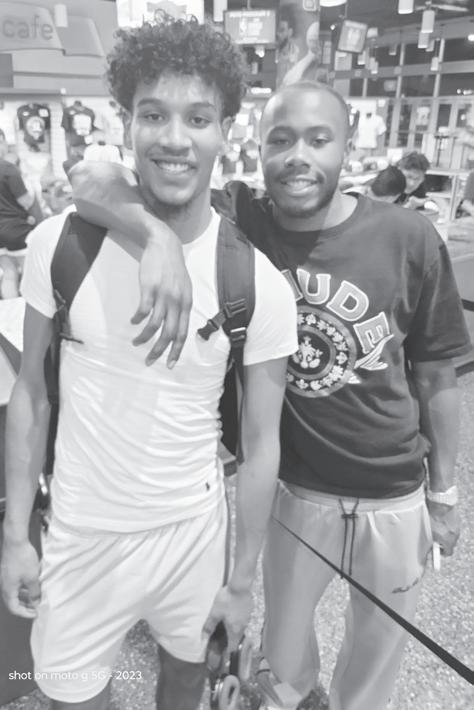
Jones had 10 points in the 94-83 loss to Minnesota last Saturday. The 6’5” guard played his prep ball at South and Cretin, then college (Indian Hills CC, Buffalo and Iowa State). He is one of nine rookies vying for training camp invites.
“Curtis has been really impressive the last two games,” Denver Summer League
Continued from page 10
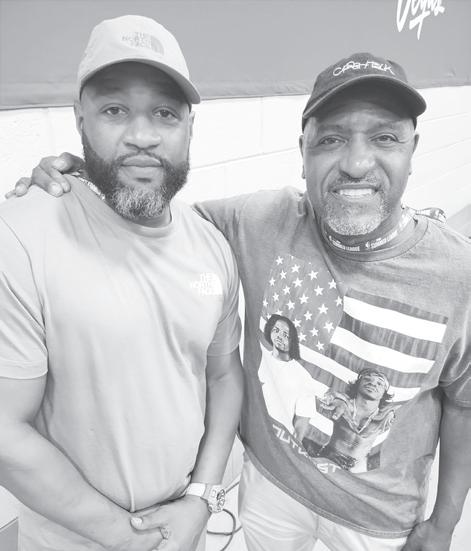
El-Amin (l) and Henry Lake
Coach Andrew Munson told me after last Saturday’s Wolves-Nuggets matchup.
“I think there’s a good chance” of getting invited to fall camp, noted Munson.
“I feel every game I’m getting better,” stressed Jones. “All I can do is keep competing and working hard as I can.”
“Summer
League players are all super hungry to prove themselves.”
El-Amin, now AnokaRamsey CC men’s head coach, boldly proclaimed that Minnesota in general, and Minneapolis in particular, is truly representing at all levels of basketball.
“The basketball IQ is at a very high level. I’m very happy that the state is being represented the way it has been and the way it is. I don’t see it stopping any time soon.”
Charles Hallman welcomes reader comments to challman@ spokesman-recorder.com.
4.
SIZE: 2 COL X 5” RATE $18.10 PCI (1ST RUN) SUBTOTAL: $181
Please proof, respond with email comfirmation to ads@spokesman-recorder.com
The MSR handles billing digitally. This means you will get e-tears and emailed invoices unless you specifically request a hard copy.
From Ads Department/MN Spokesman-Recorder
Phone: 612-827-4021
FOR BILLING INQUIRIES & TEARSHEETS
PLEASE CONTACT
ACCOUNTING DEPT
BILLING@SPOKESMAN-RECRDER.COM
EMPLOYMENT DISPLAY
SIZE: 2COL X 2 INCH
RATE: $44.60 PER COL. INCH
TOTAL: $178.40
1177 West Seventh Street Saint Paul, Minnesota 55102 651-454-3600 jpg@sworgatto.com paulg@sworgatto.com Minnesota Spokesman-Recorder July 10, 17, 24, 2025
Please proof, respond with email comfirmation to ads@spokesman-recorder.com. For more exposure: We are also inviting our clients to advertise on our website for 2 weeks for a flat fee of $150 per position with the purchase of print ad
Continued from page 10
league’s midseason classic.
“It’s been fun,” she said.
The MSR handles billing digitally. This means you will get e-tears and emailed invoices unless you specifically request a hard copy.
think having that time not fully coaching a team like I did at the ‘U,’ where you’re focused on [the whole team].
“My individual workouts got pretty sharp, and now, boom! Here I am working with [individual] players, whoever it is. Now I’m just a little bit more comfortable on that than I would have been probably if I just came [here] right from being a head coach into an assistant.
“Now I had the time to develop some of the small group work, some of the skills, some of the fundamentals,” explained Whalen. “The biggest things that I miss was just being in the gym or being on a team.
First-time All Stars
Among the first-time All Stars are rookie Kiki Iriafen (Washington) and veterans Kayla Thorton (Golden State) and Seattle’s Gabby Williams.
“You miss the people. You miss being in the gym. You miss being a part of something that you are accustomed to every single day.”
Iriafen was the fourth overall pick in this year’s draft and has started every game for the Mystics this season, tied for fourth in the WNBA in rebounding.
Please proof, respond with email confirmation to ads@ spokesman-recorder.com The MSR handles billing digitally. This means you will get e-tears and e-mailed invoices unless you specifically request a hard copy.
In Re: Estate of Daniel Ryan Hurley, Deceased TO ALL INTERESTED PERSONS AND CREDITORS: Notice is
Charles Hallman welcomes reader comments to challman@ spokesman-recorder.com. SOE
my family, my community, those I love in the long term, and that’s something that I think motivates and drives me every single day.”
“It’s great to just do whatever you want and have this free time and have the flexibility [after leaving the Gophers]. But you missed the people. You miss being in the gym. You miss being a part of something that you are accustomed to every single day.”
This weekend in Indy, Whalen once again will be at a WASG — hopefully on the winning side in the
Thorton, a 10th year forward, is the second-most veteran player in league history to make their first AllStar contest. She leads the expansion Valkyries in scoring and rebounding.
Williams leads the league this season in steals, thus far posting career highs in points, assists and steals in her fourth season with the Storm.
Charles Hallman welcomes reader comments to challman@ spokesman-recorder.com.

AS VEGAS — It is the second consecutive NBA Summer League appearance for Minnesota Timberwolves guards
Terrance Shannon Jr. and Rob Dillingham, both of whom were rookies last summer when they played in the Vegas annual summer tournament.
Dillingham and Shannon Jr. are among the 12 Blacks on the Wolves’ 15-member Summer League team. Each said in separate interviews prior to coming to Vegas last week that they are better prepared for action than they were last summer, when they arrived just weeks after being drafted by Minnesota.
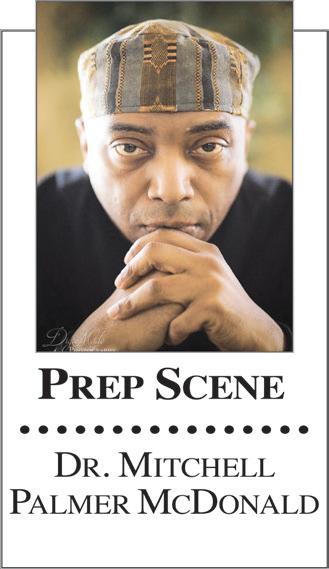
his week’s Fab Five photo spread features a July 6, 80-75 Minnesota Lynx WNBA victory over the Chicago Sky at Target Center.
Courtney Williams continued her outstanding play, scoring a game-high 25 points; Napheesa Collier had 21, Kayla McBride added 11, and Diamond Miller chipped in 10 off the bench.
Former Lakeville North High School and University of Minnesota standout Rachel Banham led the Sky with


“Yeah, for sure, it’s just like a more comfortable feeling,” said the 6’2” Dillingham.
“Definitely the second year is easier because everything’s not so new this year.”
The 6’6” Shannon added, “I feel like I’m going a lot harder, taking care of my body even
20 points, Angel Reese had 16 points along with 17 rebounds, Elizabeth Williams added 12, and Ariel Atkins and Michaela Onyenwere chipped in 11 apiece.

Dr. Mitchell Palmer McDonald welcomes reader comments to mcdeezy05@gmail.com.
more than I did the year before. I’m just going really hard, and it’s more attention to detail of what I’m working on.”
Both players are projected to be key parts of the Wolves’ 2025-26 plans. Dillingham and Shannon both showed flashes of brilliance during their rookie seasons, and both said
they hoped to show the team coaches that they are ready to contribute this summer.
Head Coach Chris Finch said he is pleased with the two young players. He isn’t coaching them this summer but watching them from the stands at Thomas & Mack Center and the Pavilion, the two locations where games were staged last week and will be wrapping up this week.
“I really love Rob’s competitiveness,” said the Wolves’ HC on Dillingham and Shannon after last Saturday’s 94-83 win over Denver. “He’s pushing pace and making really good decisions on offense. He is trying to play into the role we see him playing for us. T.J. continues to get better and better… He’s playing with a lot of force.”
Dillingham finished with 15 points, and Shannon led the
team with 24 points. “This is what [summer league] is for, to put these guys in situations and do it over and over again in meaningful situations,” Finch pointed out.
“I feel I can do a lot more,” Shannon told me after the game. “I want to get better every game.”
“Solid, but not as good as I could be playing,” admitted Dillingham afterwards. “I feel it is a process.”
“Summer League [players] are all super hungry to prove themselves,” said Finch.
Wet feet
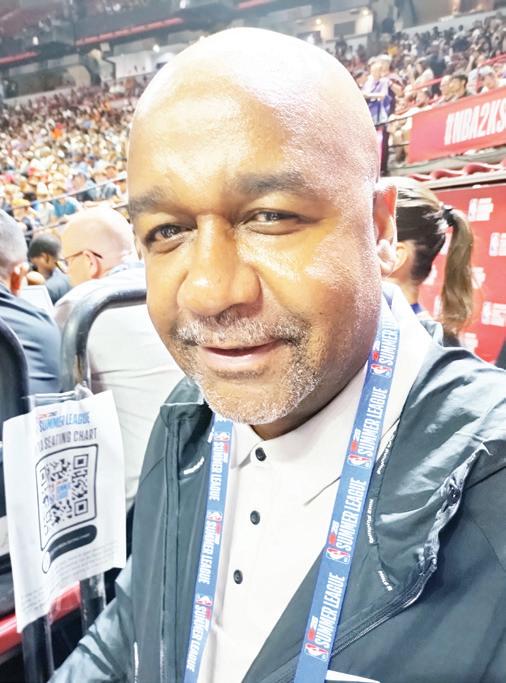
This was only my secondever appearance at the Vegas summer games. During our time here, we talked to players, coaches and fans for their impressions. At least eight games were played daily at the UNLV campus to large crowds.
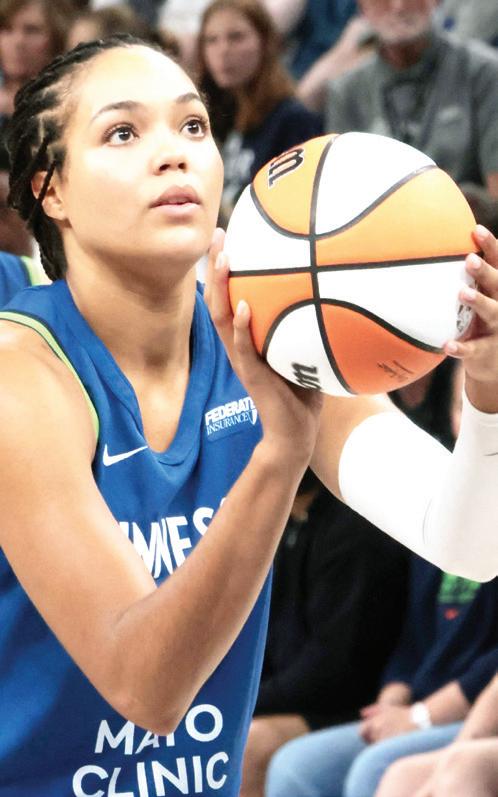


“It’s a good way to get their feet wet for the individual teams to look at what player X is and what we need to focus on,” said former college coach John Thompson III, now Monumental Basketball vicepresident — the group owns

t’s been a few weeks since Jalen Travis took his first steps as a professional football player. He was the only Minneapolis native drafted in April’s NFL draft (fourth round, Indianapolis).
“I’m doing well, feeling good,” said Travis, the Minneapolis De La Salle and Princeton graduate, who played his final season of eligibility at Iowa State. The 6’7” nearly 340 pound offensive lineman recently talked to the MSR while at home for a spell before heading back to Indy for training camp later this month.
Travis went through OTAs (Organized Team Activities), which each NFL club typically conducts during the off-
season. “I’ve enjoyed it,” he reported.
“OTAs move super-fast. I think that was the real welcome to professional football. This is my full-time job, and it’s something that I think I’m realizing I’m more blessed to do [this] by the day.”
Expectedly, Travis and his fellow rookie teammates had to quickly learn the ropes. “I think for every rookie in terms of coming in, getting caught up to the vets, learning the playbook, getting used to the speed of play, the schedules,” he pointed out. “We had some pretty long days — 10hour days, 12-hour days in the facility.
“It was like…fall camp 2.0,”
stressed Travis. “I thought it was awesome. I had the chance to connect and play along [with] some of the vets, and started building chemistry from the jump, which was super beneficial for me.”
“I
think it is extremely humbling that I have the privilege and the opportunity to play a game that I love for a living.”
The Colts rookies also did some off-field team bonding during the scheduled OTAs in late May and early June: “We spent some time at the Indy 500 race track as a rookie class.
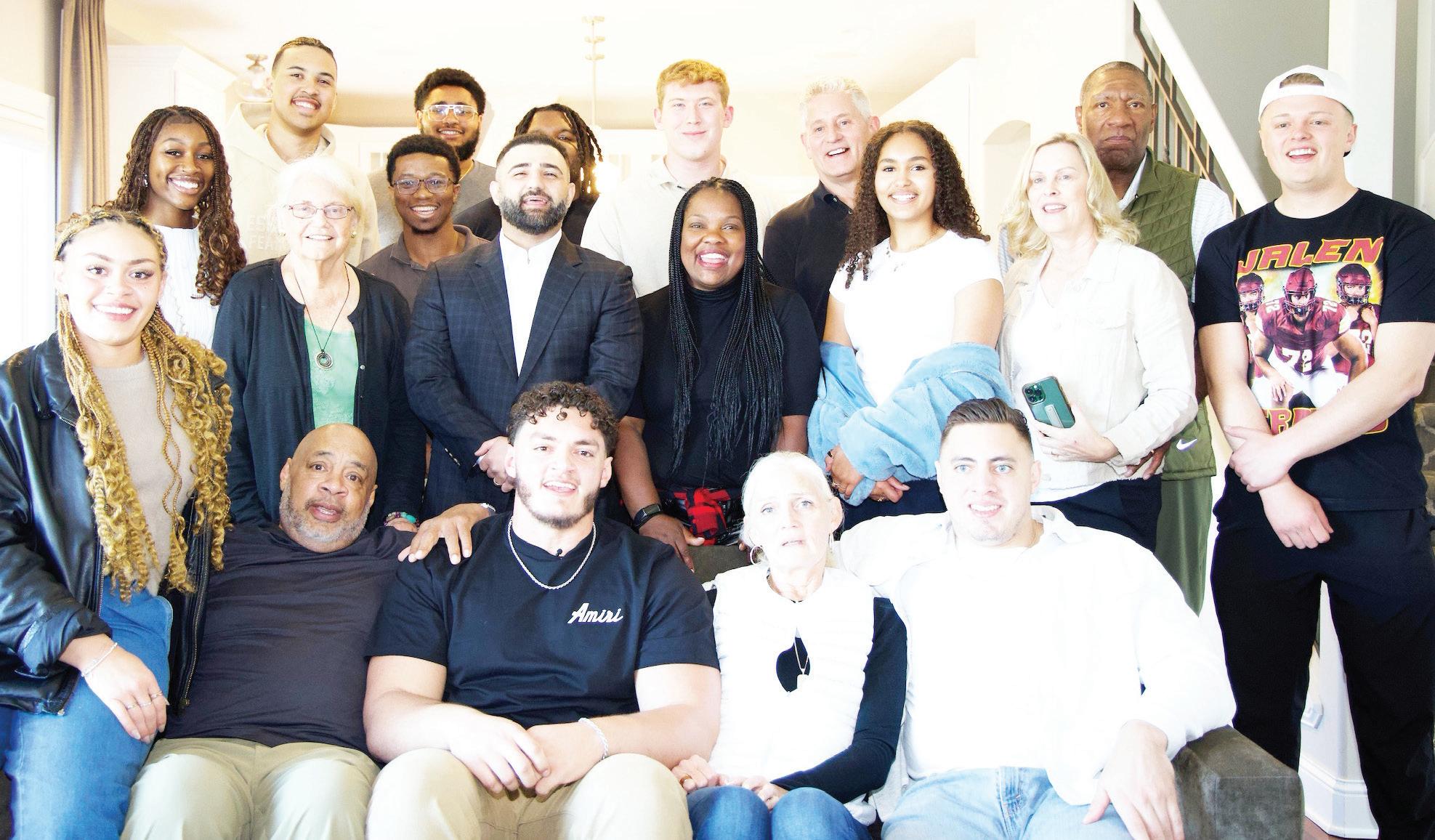
We had a chance to go behind the scenes at the Indianapolis Zoo. [The] other rookie teambuilding and workshop activities was pretty awesome.
“Spending time with some guys in the offensive line room…and working just to get to know them and them to know me, I think brought some light to a relatively intense setting.”
NFL teams are permitted to run 7-on-7 and 11-on-11 drills but no live contact during the OTAs, which is strictly voluntary as part of the NFL’s offseason program. Later this month, Travis will return to Indianapolis to report to fall training camp, which starts on July 23 and runs through August 14. He said he can’t wait.
“People will tell you that the hardest part about playing in the NFL is not necessarily getting there but staying there,” said the Colts rookie. “I think wanting to realize sooner and sooner by the day as someone who aspires and dreams of playing a long time in this league, I want to hold that dream as closely as I can, and really nurture it and give it everything that it needs so I can live it out day in and day out.
“I think it is extremely humbling that I have the privilege and the opportunity, the blessing to play a game that I
By Charles Hallman Sports Columnist
indsay Whalen is back at the WNBA All-Star Game, but this time as a coach.
The 2025 WASG is this Saturday, July 19, in Indianapolis.
Minnesota Lynx Head Coach Cheryl Reeve is one of the game’s coaches, and Whalen in her first year as Lynx assistant coach is one of the assistants as part of Team Collier’s coaching staff.
Whalen was a five-time W All-Star during her 15-year pro career with Connecticut and Minnesota, where she helped the Lynx to four league championships before retiring as a player in 2018. The two-time Hall of Famer and former Gopher great returns to the sidelines after almost two years away since leaving as Minnesota head coach in 2023 after five years.
It’s about time, she told us before her first season as a first-time WNBA assistant coach. “It’s been two years,” said Whalen of her unexpected hiatus from coaching.
She has been involved in basketball activities such as working camps and USA Basketball events. “[I was] doing a lot of the skill work with younger players [during] that time off.”
It also allowed her time to decide whether to get back into active coaching.
“I was getting into the col-
lege [basketball] season. Maybe do I want to [go into] broadcasting?” the Hutchinson, Minn. native recalled thinking before she got an unexpected text from Coach Reeve last fall with an offer too good to ignore or turn down.

Plus, Whalen said she had gotten a better perspective since being away, which uniquely prepared her for her current job. As a head coach, she was too often consumed with ensuring that everything was done.
“Now as an assistant, working with guards and working with different skills and different fundamentals and different roles,” stressed Whalen, “I